Insight
Local leaders to take the strain under 'levelling up' missions

'Levelling up' still means nothing and everything.That much is emphasised by the length of the white paper published today: 332 pages.On one hand, if you can't sum it up in, well, something much shorter than that, are you clear on what you're saying at all?On the other, when you're taking on something as wide and deep as the UK's regional inequalities, where do you start and where do you stop?The government have settled on 12 'missions' - from better broadband to longer lives - and given themselves until 2030 to at least make a mark with all of them.A lot of the detail - and the funding - behind how that can be achieved is still lacking.But one area where our region has learned a fair bit more today is with the so-called "devolution revolution".
County Durham is being invited to take up a new 'county deal', with local powers over things like transport and skills. The council's leaders are enthusiastic.Ministers want a new mayor with similar powers for York and North Yorkshire. This is linked to the council reorganisation there, and leaders of both the existing county and city councils are keen.And the government hope the North of Tyne combined authority will expand and take in Sunderland, South Tyneside and Gateshead too. This has been a messy business over the last few years, with the councils to the south of the river pulling out of a deal in 2016, leaving an authority that covers half of the Tyne & Wear Metro and has been denied full transport funding. Now though, having worked together closely during the pandemic, "tribalism has drifted into the background", says Graeme Miller, chair of the group of south of Tyne councils, and "we're serious" about coming together.It's reasonable to question, of course, why we need another set of politicians and their entourages. What difference will it make? In a 2004 referendum, the people of the North East voted resoundingly against a regional assembly (with Dominic Cummings - remember him? - among the victorious campaigners).Now though, it seems the argument has already been decided, in the other side's favour. The government are focusing attention and investment on places that already have a mayoral combined authority, as we've seen in the Tees Valley.
The existing North of Tyne mayor Jamie Driscoll has described devolution as "the only game in town." Some areas have, until now, simply been left out. The plans set out in the white paper today would mean every part of our region having a devolution deal of some kind.Organisations which research and campaign on behalf of the north, like IPPR North and the Northern Powerhouse Partnership, have consistently called for more powers to be spread out from Whitehall. It's about local decision-making. It brought to mind the proverb: "give a man a fish and you feed him for a day; teach a man to fish and you feed him for a lifetime".From the government's point of view, it shares out the responsibility for trying to meet their new targets. And it doesn't cost much - primarily in the sense that the same amount of money can be distributed locally rather than nationally.Of course, it's not a fix-all for everything, it will come to nothing without proper funding, and ministers will have to show they're not favouring Conservative-held areas.'Levelling up' will not always be such a buzz-phrase, and Boris Johnson's days as PM may be numbered, but for the former London mayor, a new set of devolution deals may just be a legacy that makes it harder for parts of our region to be forgotten about again.